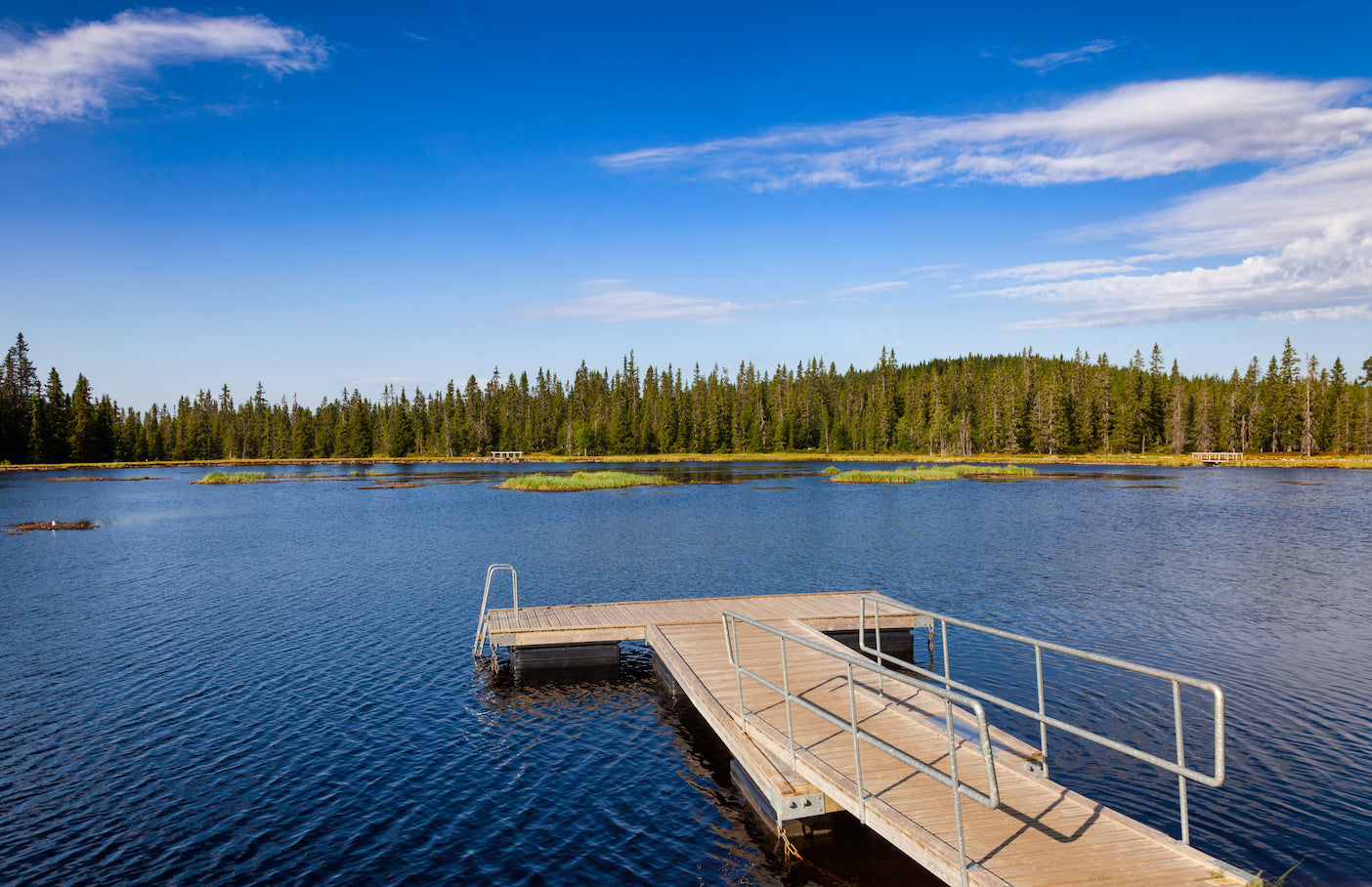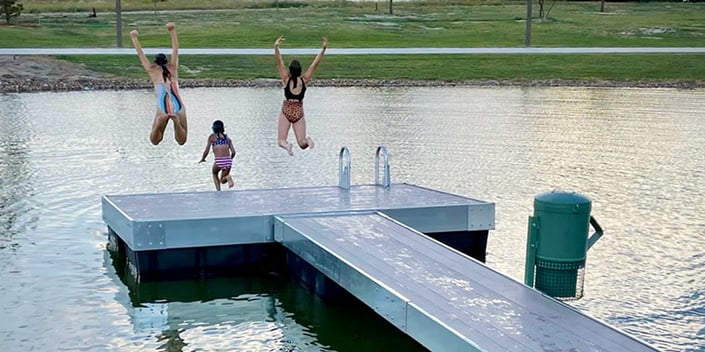How Floating Dock Company Knowledge Can Elevate Your Beachfront Experience
How Floating Dock Company Knowledge Can Elevate Your Beachfront Experience
Blog Article
Floating Docks: The Ideal Choice for Versatile Water Gain Access To
Floating docks present a compelling option for a range of water gain access to requires, offering convenience that goes beyond conventional mooring alternatives. The modular nature of floating docks facilitates modification, catering to certain needs.
Benefits of Floating Docks
Floating docks offer various advantages that enhance water gain access to for numerous applications. Their capacity to climb and fall with transforming water levels makes them specifically advantageous in atmospheres with fluctuating trends or seasonal variations. This adaptability makes sure that vessels can easily anchor without worry for the water's depth, offering a dependable system for recreational, commercial, and commercial usages.
In addition, floating docks are often constructed from long lasting products that resist rust, making them appropriate for lasting use in marine settings. Their setup is generally less invasive than standard fixed docks, decreasing the environmental impact and assisting in quicker release (floating dock services). This adaptability permits much easier relocation or reconfiguration according to customer requirements or environmental changes
Safety is another crucial advantage; floating docks can give secure gain access to for people boarding or disembarking from watercrafts and decrease the risk of crashes associated with unpredictable surfaces. Moreover, they can be developed to fit a selection of accessories, such as fenders and cleats, enhancing performance. Overall, floating docks represent an efficient remedy for enhancing water access throughout diverse fields while promoting safety and environmental sustainability.

Types of Floating Docks
Numerous sorts of floating docks satisfy various needs and atmospheres, each developed with certain functions to optimize performance. The most usual types include modular docks, which are composed of interlacing sections that permit very easy personalization and growth. These docks are perfect for leisure usage, as they can be customized to fit various boat sizes and water conditions.
Another prominent alternative is the stationary floating dock, which remains anchored in area however drifts with transforming water levels. floating docks. This type is particularly fit for locations with minimal tidal fluctuations, supplying steady accessibility for angling or swimming. Additionally, there are drive-on docks, which feature a sloped layout that enables watercrafts to easily drive on and off, making them ideal for individual watercraft and smaller vessels
For business applications, durable floating docks are offered, built from reinforced materials to stand up to considerable tons and severe aquatic settings. Finally, green floating docks use lasting materials and designs to reduce ecological impact, typically incorporating attributes like greenery to sustain neighborhood wild animals. Recognizing the various kinds of floating docks makes sure that customers can select the most appropriate service for their particular demands.
Installation Process Review
A successful setup of floating docks needs cautious preparation and interest to information to guarantee ideal performance and safety and security. The preliminary action involves examining the site problems, including water depth, current, and possible obstacles. This analysis informs the choice of the ideal dock products and design tailored to the specific environment.
Next, acquiring required licenses is critical, as numerous jurisdictions have important link guidelines regarding building and construction on water bodies. As soon as authorizations are safeguarded, the setup can proceed. Begin by preparing the structure, which may include anchoring systems or pilings tailored to the dock kind and neighborhood problems.
Following the structure configuration, set up the dock sections according to supplier specifications. Make sure that all elements are firmly attached and straightened to withstand environmental stress and anxieties. Position the dock in the designated area, ensuring it is level and steady.

Maintenance Tips and Ideal Practices
After the installment procedure is full, ongoing maintenance plays a crucial role in making sure the durability and capability of floating docks. Routine assessments need to be conducted to determine any type of indicators of wear and tear, wear, or damage - floating dock services. Look for any loosened installations, fractures, or splitting up in the dock sections, as these can jeopardize structural stability
Cleaning up the dock is important to get rid of particles, algae, and various other accumulation that can affect its look and safety and security. Use a gentle pressure clean periodically to my sources preserve tidiness without check out this site creating damages to the surface. In addition, applying a protective sealer every couple of years can aid enhance durability and resist ecological wear.
Pay focus to the mooring lines and supports, guaranteeing they are safe and cost-free from rust. Replace any type of abject components immediately to avoid dangers. Seasonal modifications may additionally be essential; during severe climate condition, rearranging or reinforcing the dock can stop damage.
Applications for Floating Docks
Floating docks offer a plethora of applications, satisfying both industrial and leisure demands. In leisure settings, they provide seamless access to rivers for activities such as boating, fishing, and swimming. Their adjustable nature enables setup in varying water levels, guaranteeing stable and secure access despite tidal fluctuations.
Commercially, floating docks are indispensable for marinas and waterside services. They help with the docking of vessels, enabling efficient discharging and filling of products. Their modular style permits simple expansion or reconfiguration to fit changing company needs, making them excellent for watercraft services, excursion operations, or angling charters.
In addition, floating docks are made use of in environmental applications such as water research and environment remediation. They can act as systems for scientific researches, checking water quality, or performing wildlife surveys without troubling delicate communities.
In commercial contexts, floating docks are utilized in building and construction jobs, giving accessibility to hard-to-reach locations for equipment and workers. Their flexibility, toughness, and very little influence on the setting make them an optimum selection for a large range of applications, improving both performance and ease of access in different water-based environments.
Final Thought
In verdict, floating docks stand for an ideal solution for varied water accessibility needs, owing to their versatility, resilience, and modular style. Floating docks offer as an important property for recreational, business, and environmental jobs, making sure trustworthy accessibility to rivers and advertising sustainable techniques in marine environments.
Floating docks present a compelling remedy for a selection of water gain access to requires, supplying flexibility that transcends typical mooring options.Floating docks deal many benefits that improve water access for numerous applications. Generally, floating docks represent an effective option for enhancing water accessibility across varied markets while promoting security and environmental sustainability.
One more preferred alternative is the fixed floating dock, which continues to be secured in location however drifts with altering water degrees.In final thought, floating docks represent an optimal option for diverse water access requires, owing to their adaptability, resilience, and modular style.
Report this page